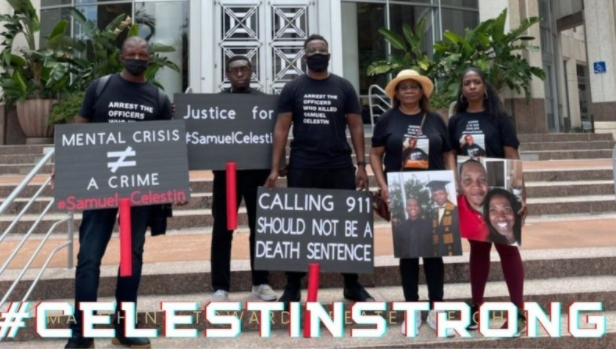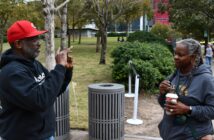The family of a Black Florida man who passed away in 2019 after being tased by Ocoee and Windermere police officers after they were called because he was suffering a mental health crisis says Orange-Osceola State Attorney Monique Worrell denied their request for another investigation in late August. Worrell denied their request for reneging on promises they allege she made when she was campaigning for the office in 2020. The family of Jean “Samuel” Celestin called the denial a show of “weak leadership,” the Orlando Sentinel reported.
“It makes me realize that when she stood out there with us, when Black Lives Matter was … marching and she was marching along with us, she knew that she would not try any of these cases,” Joanne Celestin, Celstin’s older sister told the Orlando Sentinel. “She has one job, one job only, and that’s to bring justice. That is her job and she refused to do so. She has failed us all.”
The denial comes after former State Attorney Aramis Ayala cleared the officers involved in Celestin’s death of any wrongdoing in 2o20.
“We are mindful of the fact that police officers have a difficult job, and that their actions during rapidly evolving events are often harshly and unfairly judged,” Linda Drane Burdick, assistant state attorney wrote in a letter to Ocoee police Chief Charles Brown and Orange County Sheriff John last year. “We also are aware that many first responders may not have sufficient training in responding to situations involving people with mental illness in acute distress.”
The incident took place on April 11, 2019, after Celestin, who was diagnosed with schizophrenia and bipolar disorder, punched his mother in the face, Joanne Celestin called 911 on her brother so that he could be taken to a mental health facility involuntary.
“When I called for help, I made it very clear this was a medical call and that he needed to be escorted to the hospital,” she said. “And instead, I have to live every single day — every day — knowing that the call I made caused my brother to lose his life in a malicious way” Joanne said. Celestin opened he door for police when they arrived at the home, he questioned whether or not they were real cops. Once he opened the door a second time he had a remote control and a knife in his hand.
After officers tased him twice, Celestin sat down and said, “I’ll stop! I’ll stop! … Arrest me. I’m so sorry,” the lawsuit claims.
However, after officers threatened to shoot him if he didn’t lie on the ground, Celestin got up and ran before being tackled the ground and tased again, body camera footage shows. Officers then tied hogtied his ankles and wrists together before realizing he wasn’t breathing. The man died suddenly of cardiorespiratory arrest while lying in the grass.
According to to family’s attorney Andrew G. Celli, Worrell had expressed in the past to the family that she believed Celestin was treated differently because of his race.
In a letter written to Worrell on last week, Celli wrote, “You described the circumstances of Samuel’s death as ‘wrong’ and ‘disgusting,’ and you characterized the actions of the officers as ‘outrageous,’ ‘unacceptable,’ and constituting ‘misconduct.’”
The letter adds, “You also forthrightly acknowledged that the fact that Samuel was Black impacted how he was treated by law enforcement.”
Worrell has not publicly responded to the family’s letter or continued call for another investigation. A petition was started by the Juneteenth Protest Coalition demanding the case be reopened.
Read more:
U.S. Government compensated slave owners for their ‘loyalty to the Union’ and for the loss of income incurred by freeing slaves
10 Historical Photos From The Civil Rights Movement



